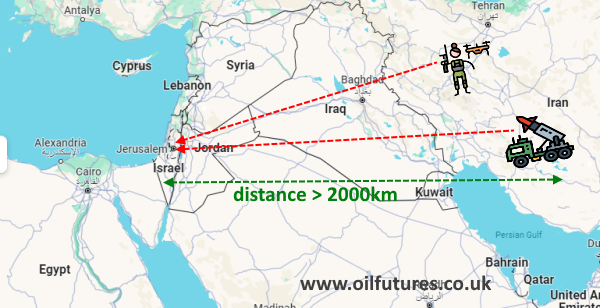Wil Iran attack Israel soon? Only time will tell! – By Hemantha Yapa Abeywardena
Credit: Google Maps
Source : oilfutures
 With Iran’s threat against Israel in a direct strike, the tension in the Middle East went up a few notches on the scale of uncertainty, as the United States made it clear once again that it would not be a passive observer if a conflict erupts.
With Iran’s threat against Israel in a direct strike, the tension in the Middle East went up a few notches on the scale of uncertainty, as the United States made it clear once again that it would not be a passive observer if a conflict erupts.
The rising tension came in the wake of the daring attack carried out by Israeli F-35 fighter jets on the building that was adjacent to the Iranian embassy in Damascus, the Syrian capital.
Seven Iranian nationals, along with a few Syrians, died in the attack, two of them were from the elite Iranian IRGC – Republican Guards; they were very high ranking officers.
In response to the attack, Ayatollahs Ali Khamenei, the Iranian supreme leader, said that Israel will be punished in kind, during an Eid message on Wednesday; he did not imply in what form the retaliation could come; nor did he say whether it was imminent, leaving the ambiguity open to interpretation by military and political analysts.
The supreme leader, however, emphasise the fact that the attack on the building next to its embassy, technically, is an attack on the Iranian soil, perhaps implying that attack will be on a target on Israeli soil.
It is the US intelligence that said yesterday an attack was imminent, perhaps knowing better than anyone else, thanks to its extensive intelligence coverage in the region in multiple forms.
No doubt, the Iranian leadership must be under tremendous pressure from the die-hard followers as well as the IRGC itself for a strong response – at least as a face-saving measure.
Israel has been targeting the IRGC officers, both on the Iranian soil and beyond, even before the war broke out on October 7, 2023, when Hamas launched an unprecedented attack on the Jewish state on its own soil; in this context, what happened this week was nothing new.
The bold move in targeting the top officers of the IRGC, however, was as serious as the Americans taking out its top general, General Qasem Soleimani, on January 3, 2020 by a drone attack, as soon as he set foot in Iraq on an official visit.
On that occasion, the Iranians threatened the US with retaliation and they kept to their words; a US military base was targeted with a barrage of missiles, causing some injuries, but no death.
It was President Trump who ordered to take out General Soleimani, blaming the latter on a significant number of the deaths of the US soldiers based in Iraq. When the US base in question was attacked by Iran, much to everyone’s surprise, President Trump refrained from commenting on it at that time; nor did the US launch a counterattack.
It was President Trump himself who lifted up the veil of secrecy that surrounded the major military event in the Middle East: he simply said recently in a political rally that he had a sort of ‘understanding‘ with the Iranians over the attack, implying that he was assured that the American lives would not be lost in a retaliatory strike; in short, the Iranians had kept their side of the bargain, according to President Trump!
President Trump also said that Israel, although warmed to the idea at first, later backed down, hinting about the displeasure of the former over the ‘U’ turn made by the then Israeli prime minister, Benjamin Netanyahu.
When the Iranian generals were attacked this week by Israel, there were reports that Iran approached the US through an intermediary, most probably the Swiss diplomats. Neither its content nor the US response is clear.
The US has, however, made it clear to the Iranians – not through intermediaries – but, in public that it neither knew nor involved in any form in the attack in question. It, however, did not appease the Iranians, as the latter blamed it on the US – for not reining in its most trusted ally in the Middle East, Israel.
Against this backdrop, both Israel and the US anticipate an imminent attack on Israeli interests – in some form.
Israel has very clearly said if they were attacked, they would attack Iran on its own soil, implying a major escalation.
Attacking Israel from Iran is a monumental challenge for Iran: Iran do not posses long-range fighter jets for such a major task; Iran, however, is supposed to have a huge arsenal of medium-range missiles and drones that in theory could reach Israel.
There is a major obstacle, though. Shia-dominated Iran has to fire them over a couple of Sunni-dominated Arab countries that could be easier said than done; on one hand, they risk being shot down; on the other hand, such a scenario will be tantamount to a major violation of the skies of the countries in question. Only recently did Iran restore diplomatic ties with some Arab countries.
As an alternative, Iran can use the countries that border Israel such as Iraq and Lebanon, while using its proxies. The two countries will vehemently oppose such a move, though, as they will be next in line of fire.
In short, Iranians have very few options if they decide to attack Israel.
In addition, the Iranian economy is in the doldrums due to heavy Western sanctions with its currency, Iranian Rial, in free fall in the last few week while losing almost 30% of its value; the inflation, meanwhile, has been skyrocketing with the ordinary citizens being trapped between a rock and a hard place.
If a major conflict breaks out on the Iranian soil, in this context, how the beleaguered Iranian public would react is anyone’s guess; Iranian authorities may lose the leverage in keeping them submissive by an iron fist.
In this context, Iranians may respond in someway, exactly like they did in the aftermath of the assassination of General Soleimani, as the stakes cannot be higher for the Islamic republic, going on the offensive; staying quiet is not an option either.
That means, the Iranians authorities will have to get their calculations right before taking on the Jewish state, as the latter can be really ruthless in the event of being under threat.
The Israelis are well known for pre-emptive strikes throughout the world, not just in the Middle East, against perceived threats.
Meanwhile, the latest tension in the Middle East has caused jitters in the oil and gas markets for obvious reasons. As of 10:40 GMT, the price of WTI, Brent and LNG, liquified natural gas, were at $86.58, $90.89 and $1.89 respectively.
As the tension mounts, the US has sent a top general to meet the Israeli defence minister as a matter of urgency. President Biden, meanwhile, warned Iran that the US commitment to the security of Israel is ironclad.
With just seven months to go before the US presidential elections, the conflict in the Middle East has left President Biden in a lurch: on one hand, he cannot afford to offend the Left-leaning democrats any more; on the other hand, a major ‘wound’ on Israel will not go down very well in the US history on President Biden’s watch in a favourable light.
That’s why there are reports of the diplomatic arm being in full swing to persuade Iran not to take drastic measures that will inevitably lead to the US being dragged into the conflict – directly.
All in all, the next few days are crucial for stability of the energy markets in particular and peace in the Middle East in general.









